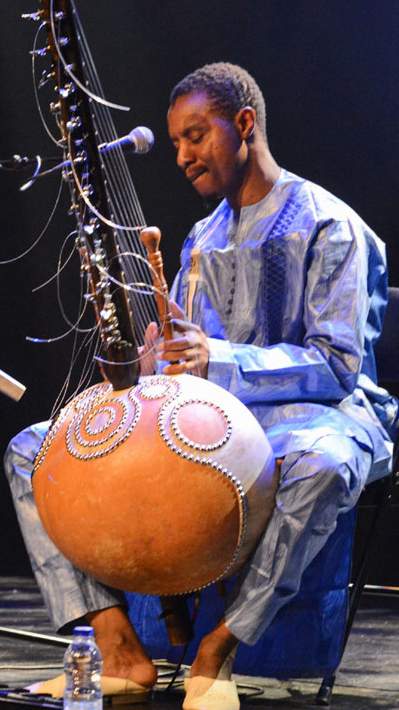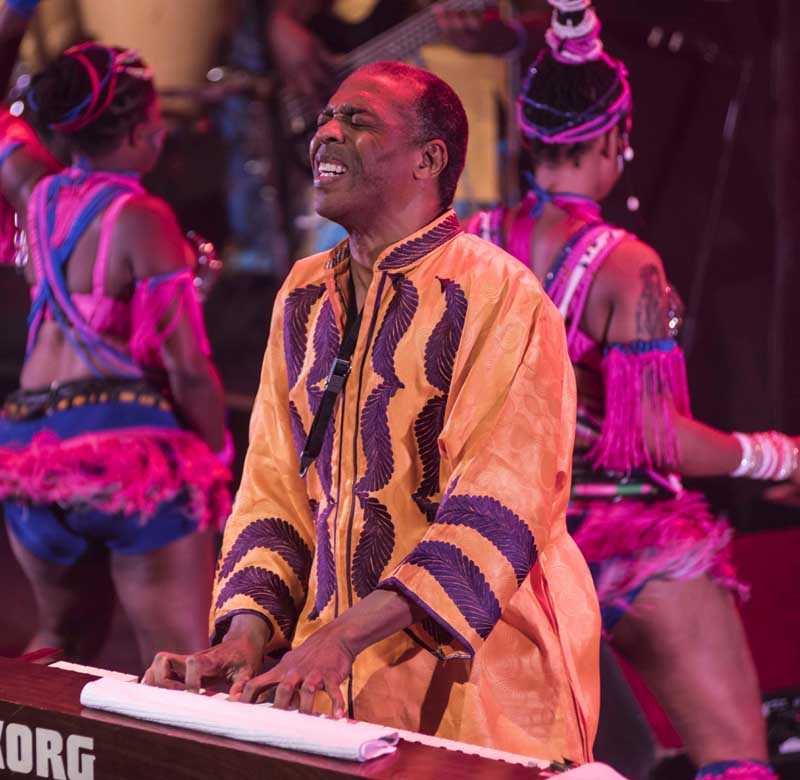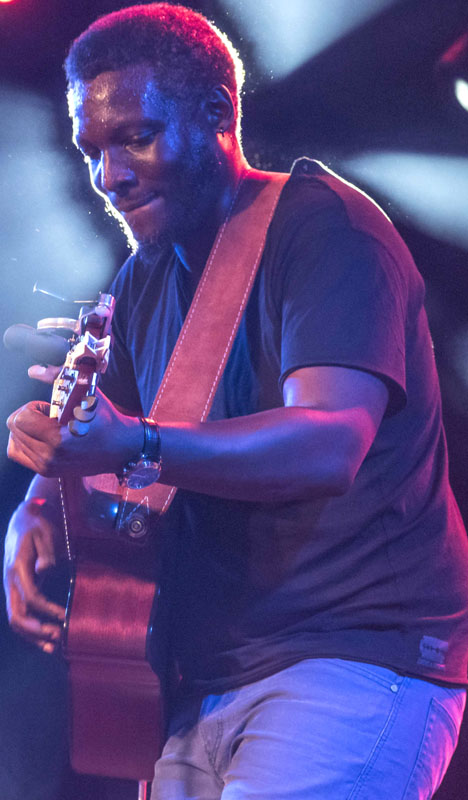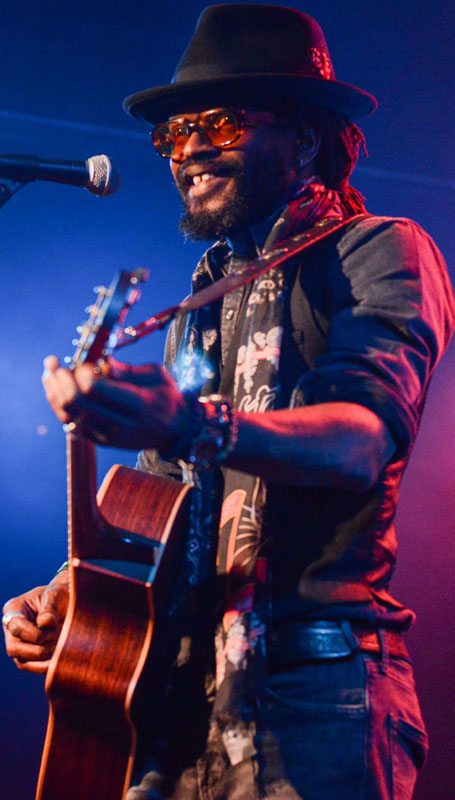There isn't a culture
in the world that doesn't accord the highest esteem to its original
music. Music speaks in a universal key that resists translation,
but communicates like no other language. At its extremes, it
provides alternative worlds, escapes from the dead-ends of life
over which we have very little control (inclement weather, climate,
politics) while on the other hand, in combination with the spoken
word, it directly offers a challenge to iniquity and injustice,
and arouses listeners to unite and change the world.
 Unsurprisingly,
Montreal’s now world famous Nuits
d’Afrique
music festival embodies these extremes unlike any festival of
its kind. This year in particular brought into focus a world
that so many musicians are trying to change, while at the same
time creating music that heals the mind, and helps us to forget
about the hurt and pain that won’t go away, and the light
that won’t show itself in the many dark places avarice
and corruption leave in their wake.
Unsurprisingly,
Montreal’s now world famous Nuits
d’Afrique
music festival embodies these extremes unlike any festival of
its kind. This year in particular brought into focus a world
that so many musicians are trying to change, while at the same
time creating music that heals the mind, and helps us to forget
about the hurt and pain that won’t go away, and the light
that won’t show itself in the many dark places avarice
and corruption leave in their wake.
When it comes to
facilitating these marvelous and necessary diversions, the festival
programmers know that there is no instrument that can compete
with the balming effects of the 21-string kora, the sound of
which is synonymous with Africa but has found a home everywhere
there’s “so much trouble in the world.” In
the hands of two of its masters, (student & teacher) Prince
Diabate (Guinee) and Djely Mori Tounkara (Mali), its soothing
sounds were never more in evidence in what was easily the most
sublime evening of the 12-day festival -- with an honourable
mention to the duo K-Iri and their heavenly harmonies.
When the body is
sufficiently engaged by music, the mind deliciously shuts down.
Throughout the festival there was ample opportunity to observe
that phenomenon. Columbia’s Zalama Crew, in one of the
free outdoor shows, put on a get-up-and-get-down-to-it show
that was Richter scale worthy, expertly combining, dance, rap,
hip-hop, and jazz. Nobody could stay still for their very particular
take on African-Latino fusion which sent the hyper-excited crowd
into the sativa-scented stratosphere.
Femi Kuti &
The Positive Force opened the festival. Backed up by a rhythm
section that was c ounter-beat
perfect, the tightly knit group’s boundless energy and
enthusiasm rocked the MTELUS. Futi’s music is equally
physical and metaphysical, and covers all of music’s critical
bases. It’s about feeling good while articulating the
message of “one love, one people, one world colour,”
from his most recent CD, One People, One World. Most
of his playlist combines deceptively engaging melodies and uplifting
counter rhythms. The group’s totally tuned-in bass player's
organic and deliriously extended bass lines wrapped themselves
around the brain like waves rolling in from some unidentified
better place. He both buoys and counters the high intensity
generated by Kuti, who jumps around the stage like someone trying
to occupy two different places at the same time. Mesmerized
by the rolling hips, the darting shoulders, the thrust of arms,
everyone was keeping perfect time in the key of Kuti.
ounter-beat
perfect, the tightly knit group’s boundless energy and
enthusiasm rocked the MTELUS. Futi’s music is equally
physical and metaphysical, and covers all of music’s critical
bases. It’s about feeling good while articulating the
message of “one love, one people, one world colour,”
from his most recent CD, One People, One World. Most
of his playlist combines deceptively engaging melodies and uplifting
counter rhythms. The group’s totally tuned-in bass player's
organic and deliriously extended bass lines wrapped themselves
around the brain like waves rolling in from some unidentified
better place. He both buoys and counters the high intensity
generated by Kuti, who jumps around the stage like someone trying
to occupy two different places at the same time. Mesmerized
by the rolling hips, the darting shoulders, the thrust of arms,
everyone was keeping perfect time in the key of Kuti. 
In the spirit of
protest that is one of the cornerstones of Les Nuits, a packed
house at the Fairmount
Theatre was treated to the very special music
of Tunisia’s Sabry Mosbah, whose songs and lyrics have
become synonymous with the Arab Spring.
To the western ear,
Mosbah’s music recalls the early folk music of Arlo Guthrie
and the Hippie movement, but in the context of Tunisia and the
politics of the Arab Spring, the familiar chord sequences and
their predictable modulations were nothing less than revolutionary.
Opting for the western diatonic scale, which emphasizes the
major keys, Mosbah's songwriting represents a complete break,
rejection of the persistently weighty Arabic minor key that
is synonymous with the severity and inflexibility of orthodox
Islam. Lest we forget, the Arabic scale was born in the intemperate
heat and despair of the Sahara, its unvarying interval equal
to the resignation to and acceptance of a fate from which there
is small chance of exit. Small wonder the many Tunisians in
the audience were hanging on every word and note, united in
the common cause that is the cry for freedom, which speaks to
the power of music to offer hope and change the world. Mosbah
reminds us that music can move us in many ways and in many directions,
and is always more than the sum of its notes.
Prior to the festival,
both Ladama (South America) and Meklit (Ethiopia) had been invited
to participate in the Ted talks, because both are on the leading
edge of advancing the cause of women through their music. Meklit’s
songwriting, in its cumulative effects, is a correction to the
disappearing art of composition (one of the casualties of monophonic
rap and hip-hop). Her playlist seamlessly threaded together
otherwise unlike, unrelated genres, but all the tracks bared
her signature interval and passion, marked by highly creative
and sometimes extraordinary changes that shunted the listener
to a very special place. Her jazz inflected compositions were
easily festival highlights, in no small part due to the note-perfect
backup supplied by her band. Her saxophonist, in particular,
was geared to the mood of the moment, a study in the art of
listening, forsaking any hint of virtuosity in respect to the
thrust of the music.
 The
best voice of the festival belonged to Senegalese born Tété,
who flawlessly backs himself up with a mean, heavily accented,
foot-stomping rhythm guitar. And while his music is bluesy (folk
influenced), his consistently devilish hooks turn many of the
composition upside down and sideways and leave you wanting to
hear the next and then again. His deep, resonant voice melts
into the brain like butter such that if you’re English
and don’t understand the French lyrics, you don’t
care because you’ve been totally seduced by the voice.
You can bet we’re going to see more of Tété
in the future.
The
best voice of the festival belonged to Senegalese born Tété,
who flawlessly backs himself up with a mean, heavily accented,
foot-stomping rhythm guitar. And while his music is bluesy (folk
influenced), his consistently devilish hooks turn many of the
composition upside down and sideways and leave you wanting to
hear the next and then again. His deep, resonant voice melts
into the brain like butter such that if you’re English
and don’t understand the French lyrics, you don’t
care because you’ve been totally seduced by the voice.
You can bet we’re going to see more of Tété
in the future.
In the heart of
the city (Quartier des spectacles) with soft cool grass under
the feet, the last six days of the festival feature free outdoor
concerts from early afternoon until closing time, which is why
Les Nuits d’Afrique is much more than the sum of its remarkable
music and myriad of activities and workshops, and of course
the famous home-away-from-home Timbuktu market place. It’s
about people from every background imaginable sharing the same
public space and creating a vibe, an ambience that privileges
everyone in attendance. “And in the end the love you take
is the love you make” is perhaps the festival’s
most lasting effect, long after the music has shut down, the
tents have been folded and the instruments put to bed.
Those who came are
already counting down the days to the 2019 festival while savouring
the empowering and ennobling aftertaste of yet another remarkable
edition of Montreal’s Les Nuits d’Afrique world
music festival.
We acknowledge and
salute festival founder M.Lamine Touré, who was appointed
to the distinguished Order of Canada (2018), the country's highest
civilian honour.
ADDITIONAL
PHOTOS